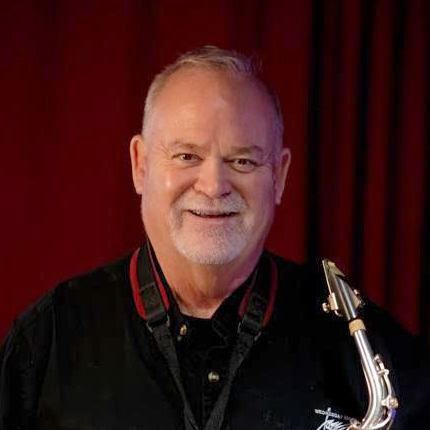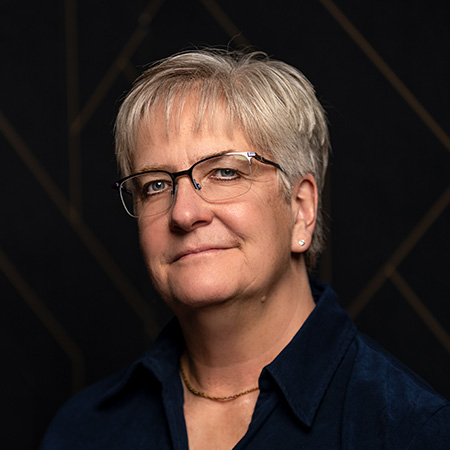We offer professional development and mentorship opportunities designed to support music educators at every stage of their careers. With so many facets to music and music education, there is always something new to learn. Connecting with experienced mentors provides valuable insights, tools and support for the future.
Our programs include both individualized sessions and larger group workshops, featuring dynamic Conservatory faculty, engaging conductors, clinicians and mentors. These opportunities also allow you to connect with our professional community and expand your network.
To join our email list for upcoming events or learn more about our mentorship and professional development programs, email clinics@mtroyal.ca.
Meet the mentorship team
Ross McIntyre

Ross McIntyre has been a conductor and educator with the Westwinds Music Society adult band organization in Calgary since 1992. He retired from the Calgary Board of Education in 2019 after 30 years of teaching junior and senior high school music. He is currently a mentor, conductor and trumpet clinician with MRU Custom Workshops.
In 1993, Ross received the Excellence in Teaching Award from the Alberta government, and in 2001, received the Tommy Banks Award for his contribution to Jazz education. In 2006, he was recognized as one of the University of Calgary's Top Forty Alumni.
Along with friend and co-producer, Samantha Whelan Kotkas, Ross received funding from the Canadian Space Agency to create From Blue To Red, a hardcover children's book and interactive online e-book. Written and illustrated by Lord Beaverbrook High School students, the book was inspired by professional mentors from across Canada. From Blue To Red features narration by Jazz legend Diana Krall and Canadian astronauts Dr. Robert Thirsk, Julie Payette and David Saint-Jacques. The e-book is available online in both English and French at www.frombluetored.net and www.dubleuaurouge.net. From Blue to Red was named Best Children's and Young Adult Book of the Year in 2013 by the Alberta Book Publishing Awards.
Ross was honored in 2013 with a Prime Minister's Award for Teaching Excellence from the Canadian government.
Q&A with Ross
Why is it important to have a mentor?
It has been my experience that I have dealt with many of the problems that young conductors are working through especially in the early part of my career and can help guide them in an expeditious manner.
What are your strengths as a mentor?
I can provide a synthesis of a lifetime of teaching experience and can help provide young educators a starting point based on my personal successes AND failures.
How can belonging to a community/network of band directors benefit your role as an educator?
Mentoring is paramount for young teachers. Proper mentoring allows inexperienced teachers to ask questions in a safe and caring environment and to gain insight to help develop their own personal practice which, in turn, gives way to the next generation of successful music educators.
How can belonging to a community/network of band directors benefit your students?
It is my intention to inspire and share my passion for teaching with young teachers and students through a strategic, systematic, caring and safe environment.
Brian Thorlacius

Brian Thorlacius taught as a music educator with the CBE for 32 years, retiring in 2011. He also spent 21 years as a Lieutenant in the Naval Reserve as the Director of Music for HMCS Tecumseh, retiring in 2010.
Brian’s clinic and adjudication work has been extensive throughout Alberta, Saskatchewan, Manitoba and Montana. In 2013, Brian conducted the University of Lethbridge Wind Orchestra for one term as a sessional instructor. His professional service includes membership in the Calgary Musicians Association Local 547 and the Alberta Band Association. He also serves on the executive board of the Alberta chapter of Phi Beta Mu, an international fraternity of outstanding Band Directors. While teaching for the CBE, Brian assisted in the development and revision of the locally developed music courses.
In 1997, Brian received the Tommy Banks Award from the Alberta Foundation for the Arts in recognition of his tireless work with students in junior and senior high school music programs as well as military cadet ensembles. He was inducted into the Phi Beta Mu International Band Master fraternity in 1999. In 2003/04, the Canadian Band Directors Association, Alberta chapter, selected him for the Elkhorn Award as the province’s director of the year. In the fall of 2005 Brian received the David Peterkin Award from Phi Beta Mu, Alberta chapter, for his years of service and dedication to band music and proliferation of Band music. In the fall of 2009, The Alberta Band Association selected Brian as the recipient of the Vondis Miller Legacy Award, recognizing his dedication to students and his support of young music educators.
In 2010, Brian was inducted into the Bandworld/John Phillip Sousa Foundation Legion of Honor. That December, at the Midwest Band conference in Chicago, he was recognized as a Laureate in the Foundation for his significant contribution and dedication to bands and band music.
Brian regularly performs on saxophone and clarinet in the Wednesday Night Band and the CFD Cappy Smart Band. He continues to mentor and serve as a conductor and clinician through Mount Royal University Conservatory, as well as other music clinic services in the Calgary area.
Q&A with Brian
Why is it important to have a mentor?
It is important to have a mentor to guide the process of music education. How to start programs as well as guiding your progress over the years. This is achieved through regular work with a mentor to draw on their years of success and experience. Being exposed to those ideas which work and do not work. Above all a mentor can help with defining the fine points of excellence in building a band and helping develop bands to an outstanding performance level.
What are your strengths as a mentor?
My strengths as a mentor are my knowledge and experience I have developed by working extensively at the junior and senior high level as well as the college level. My military conducting with the reserves at the unit and National level, as well as with the Cadets, has afforded me an experience that many do not get. I also feel very comfortable in both jazz and concert band idioms at all levels.
How can belonging to a community/network of band directors benefit your role as an educator?
Belonging to a community or network of band educators allows one to draw on the vast years of experience of your colleagues as well as their specialty techniques and methods.
How can belonging to a community/network of band directors benefit your students?
Belonging to this community for your students allows almost instantaneous feedback for questions or concerns on their instruments and band music performance. This is done by contacting and/or working with your network of people.
Jane McLauchlin

Jane McLauchlin knew at a young age she wanted to be a teacher. Along with growing up in a house full of music, the decision to pursue a career as a music teacher became clear during a Grade 7 band class. Since then, she has had a successful career teaching award-winning Concert and Jazz Bands, along with General Music and African Drumming in Calgary for over 30 years. She has been guest conductor at the Calgary Summer Band Workshop, Northern Alberta Junior High Honor Band, Chinook Winds Honor bands, and adjudicator for the Alberta International Band Festival and ABA Festival of Bands.
Although retired from her regular teaching position with the CBE, Jane continues to be a clinician, guest conductor and guest teacher. She is presently honored to be serving as Artistic Director for the Vic Lewis Band Festival in Canmore, as well as being very involved with Westwinds Music Society as Artistic Director, Blue Concert Band director and playing Bari Sax in the Westwinds Gold South Jazz Band.
Inspired by her daughter who is just about to enter the world of teaching band and music, Jane really sees the value of strong mentorship for our new and inexperienced colleagues entering the incredibly valuable and rewarding world of teaching band.
Q&A with Jane
Why is it important to have a mentor?
What an incredible opportunity! To have an experienced, successful, well-regarded music teacher to help guide your beginning years as a teacher? Yes – it takes a certain amount of humility and vulnerability to open yourself to this opportunity, but every mentor only wants their mentee to successfully pursue their passion and stay the course in their career.
What are your strengths as a mentor?
Years of experience with a wide variety of learners, as I’ve taught in nearly every quadrant of the city. Having said that, more of my career has been with the “have not”’ – very few of my students’ owned instruments, had private lessons of any kind or any musical experience at all beyond what they received in elementary school. Yet, I was able to produce very successful bands, many receiving awards/recognition – particularly in my later years as I “figured it out!” I believe that not only can I offer guidance towards this result, but I believe I’m kind, very down-to-earth, realistic in my expectations and really appreciate a sense of humor! Over the years, I have developed excellent classroom management skills and believe strongly in developing and demonstrating positive community through students supporting each other in the classroom.
How can belonging to a community/network of band directors benefit your role as an educator?
I became the best teacher I have ever been when I finally realized I’m not an island. The greater community is the BEST way to learn, find support, get advice and never feel alone – which is particularly important because music teachers are almost always alone in their subject area in their school. And as hard as we all work, no one understands it except other music teachers!
How can belonging to a community/network of band directors benefit your students?
Answers to questions, suggestions for everything from repertoire to how to organize a band camp, to dealing with administration and so on … There is no limit!
Kathie Van Lare

Kathie Van Lare, born and raised in Calgary, has been teaching music in the Calgary area for 35 years. Active as a guest conductor and adjudicator throughout much of Western Canada, Kathie also directs two area community bands: Foothills Music Society Concert Band and the Westwinds Music Society Gold Jazz South Big Band. Kathie is currently Co-President of Women Band Directors International – Alberta Chapter and is also Director of the newly formed Calgary Women’s Jazz Orchestra.
Bands under Kathie’s direction have been the recipients of several awards and she has been the recipient of various personal awards. From the Alberta Band Association: the Elkhorn Award as the Band Director of the Year, the Vondis Miller Legacy Award and an ABA Honorary Lifetime Membership. She’s a Laureate in John Philip Sousa Legion of Honor and received the Scroll of Excellence from Women Band Directors International. Kathie continues to be active as a freelance musician (trumpet) and has performed with many groups, including the Calgary Philharmonic Orchestra, the Rocky Mountain Symphony Orchestra, Prime Time Big Band, Calgary Jazz Orchestra, Alberta Winds and Altius Brass. Besides music, Kathie enjoys woodworking, horseback riding, golf and is an avid baseball fan. Go Cardinals!
Q&A with Kathie
Why is it important to have a mentor?
Teaching is equal parts rewarding and challenging. Connecting with students and knowing that you have a significant role in their lives is of tremendous importance and a tremendous responsibility. There are so many demands on your time and as band teachers as there are so many things to know. So many things directly related to teaching music and so many things that are not. Having a mentor that has "been there and done that" can help you streamline the process in navigating what you must know and do to be your most successful.
What are your strengths as a mentor?
I feel my strengths as a mentor come from my many years of experience. In my 35 years of teaching, I've taught junior and senior high school. I've taught concert band, jazz band, musical theatre, choir and a few non-music subjects, including social studies, math, health and CALM. I've attended countless workshops over the years on a wide variety of topics that relate directly to teaching and workshops on how to deal with all the other stuff that is part of your job as a teacher. I've tried many ways to do things and experienced both failure and success. I know how hard the job is and I feel I am a good resource for providing ideas on how to approach what needs and challenges the job will inevitably send your way.
How can belonging to a community/network of band directors benefit your role as an educator?
There is so much to know, and it is unreasonable to think that you can know the most effective and efficient way of teaching everything that you are expected to teach. Simply put, having a network to draw on where you don't necessarily have the answers will help you not only be more effective, efficient and successful, it will help you keep a better work-life balance. This is a job that can be all-consuming if you allow it. We band teachers are typically an island in our schools and having a network of resources and support that “gets it” is invaluable to you.
How can belonging to a community/network of band directors benefit your students?
A support system that includes access to useful information and strategies can only enable your students to be successful in music as well as other aspects of their lives.
Sarah Drew

Sarah Drew (B. Mus, Ed Cert, Diploma Wind Band Conducting) is thrilled to be involved as a mentor and guest conductor with MRU. Sarah recently retired from 35 years as a middle school band teacher in Calgary. Being free to guest conduct, mentor and adjudicate, as well as play tennis, swim and cycle, she is enjoying this new stage of life, which has included playing in a community band in Mesa, AZ this winter. Sarah taught K-9 music at a variety of schools in the Calgary area, teaching general music, bands, choirs, guitars and jazz, where her desire was to impact her student’s lives with the love and power of music. Her performing groups consistently achieved high standards of excellence, but she is most proud of her students becoming caring, creative and confident citizens. To the shock of many, one of her favorite parts of being a music teacher is starting young instrumentalists in beginning band. In fact, she has co-written a beginning band method called Kodaly for Band which is in use in many schools across North America.
Sarah has directed bands at Calgary’s Summer Band Workshop, MusicCamrose as well as guest conducted and adjudicated across the province of Alberta including the ABA Festival of Bands and AIBF. She has been involved in coaching the University of Calgary music education lab band students and has been a part of the ATA Mentorship program to walk alongside new music teachers. Sarah has had roles on the boards of ABA and ABIF, as well as a member of the Arts and Culture board in her hometown of Cochrane, Alberta. She currently serves as the Co-President of the Women Band Directors International (WBDI) – Alberta Chapter.
Her love of music also extends to adults as she was the Founder and Artistic Director of the Sher-Wood-Like-To-Play Adult Community Band in Calgary for 17 years, as well as the director of the Cochrane Children’s Choir.
Living in Cochrane with her family gives Sarah quick access to the river pathways and the mountains where she loves to run, hike, x-country ski and cycle.
Q&A with Sarah
Why is it important to have a mentor?
It is important to have a mentor because band teachers are most frequently the only one teaching their subject in a school. While other disciplines have a team in the building, the band teacher hardly ever has someone to bounce ideas off or ask for suggestions or help. Unless you have a musician on staff, there is no one who can understand all the aspects of what happens in the band room. A leader in your school may be tasked with evaluating you and giving you feedback, but if they don’t know what an eighth note is or what a balanced band sounds like, or how to differentiate between the various articulations, they can give some general feedback but really can’t help a developing band teacher to improve their skills.
It is also important to have a mentor because the job of a band teacher is so immense. It isn’t just the subject material, but all the other parts of the job that a teacher may need some guidance with. Budgets, timetabling, trips/tours, retention/recruitment, communicating with parents, fundraising, balancing a band, fixing instruments, budgets, inventory, library, advocacy, etc. Other subject teachers don’t have all these additional aspects to deal with, and an experienced band mentor hopefully has some helpful ideas.
What are your strengths as a mentor?
I think my strengths as a mentor come from my life as a middle school specialist. I am passionate about teaching middle school age students and love the starting process of beginners. In addition, it seems that many middle school programs now have some general music classes attached to the band teacher’s timetables, and I have always had some kind of elementary teaching and choral ensembles as part of all my various positions. I have taught years of ukulele, recorder, choir, guitar and general music so I can also give guidance to those courses and how they intersect and can help prepare students for band. I see the middle school band program in a wider context and have experience with how things connect.
I also think one of my strengths is to be a safe, warm person who knows the importance of establishing a non-judgmental, unthreatening relationship with my mentees. If they feel like they can take risks and be vulnerable to their strengths and weaknesses, and aren’t afraid to be themselves, they are able to take in and learn from the experience and from the relationship. Just like creating a safe culture in your band room, I believe it is important for a mentee to feel comfortable trying new things and to be honest about their practice with their mentor. I think I am a good technician and can observe and pick out places of improvement and have some tricks to work on different things, but if I don’t have a positive and affirming relationship with my mentee, it doesn’t matter how skilled I am. I love coming along side someone, over the long term, in their classroom, seeing where they are at, and helping them get to their next step.
How can belonging to a community/network of band directors benefit your role as an educator?
Whereas other subject teachers typically have a community of teachers within their own schools who teach the same subject, band teachers need to reach outside their building to find like-minded teachers. However, the role of a music teacher is so immense, it is so difficult to find time to reach out and establish these connections. By helping connect teachers to each other to create such a community, a network is formed that assists band directors in a myriad of ways. Primarily just to encounter others who understand your job is a huge support. Not having to explain, having others who “get it” instantly makes you feel not as lonely and like you aren’t the only one who faces certain things. Also, there is so much we can learn from each other, such as: great repertoire ideas, tips and tricks for anything like tone, tonguing, balance, warm-ups and suggestions for trips/camps/festivals and the inside track to '”how things work around here.” Being the only one at a school, where you can feel like no one understands and where you constantly have to advocate for your program and prove your validity and often wonder if you are a complete failure, to have a group of friends who are out there doing the same thing, feeling the same things, helps you keep going and realize that you probably are doing a great job after all. A community helps support your mental health, gives you perspective, gives you ideas, saves you time and makes you feel like you aren’t so crazy after all! :) It is of the utmost importance!
How can belonging to a community/network of band directors benefit your students?
Belonging to a community of band directors helps your students because they benefit when you as a teacher feel supported and feel better about yourself. My students always loved going to festivals and workshops where they saw me in my social milieu. They were proud to be associated with me when I was held in esteem by my peers. When a band teacher is supported and encouraged by others, they have more positive energy to pass on to their students. When a teacher has fresh ideas and some solutions to some tricky teaching issues, they can pass them on, and the students will improve as well. I believe we should be “lifelong learners” and that as musicians (and educators) we never arrive. There is always a next step for us, as well as for our students. By modelling this attitude and behavior, that we are always learning and growing, we pass this on to our students.
What our clients say
Connect with us
If you need a hand registering or have a question about our programs, we would love to help you!

